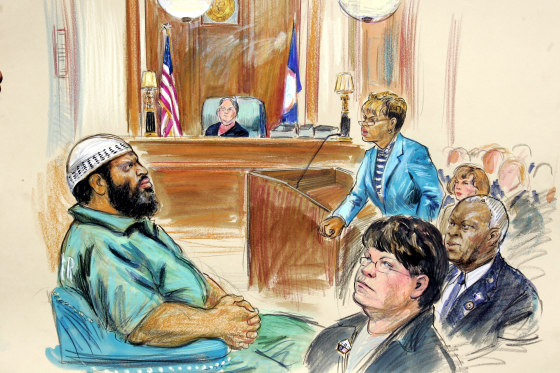The federal judge in the trial of Zacarias Moussaoui, the only person ever put on trial in the U.S. in the 9/11 attacks, said Thursday that the trial proved that civilian courts can successfully handle terrorism cases, despite the abundant challenges.
U.S. District Judge Leonie Brinkema presided over the lengthy trial in Alexandria, Virginia. The courthouse is near the Pentagon, which was one of the three targets hit by terrorist hijackers 20 years ago this week. She made rare public comments about the trial during a panel discussion hosted by the U.S. Attorney's Office for Eastern Virginia.
"I think our approach to terrorists should be really an approach to criminals. They shouldn't get any heightened respect or treatment," she said.
Brinkema noted that when the trial was over, Moussaoui asked to withdraw his guilty plea and sought a new trial. He assumed he would get the death penalty; when he did not, he said he realized he could get a fair trial even with American jurors, she recalled.
Moussaoui, who came to the U.S. from France, was arrested in 2001 28 days before the 9/11 attacks. Officials at a flight school in Minneapolis told the FBI that they were suspicious of Moussaoui's desire to learn only how to operate a Boeing 747 jetliner. They said he told them it as "an ego boosting thing."
The FBI learned that Moussaoui had no background in aviation and lacked even a private pilot's license. Agents arrested him after they became concerned that he was planning to commit an act of terrorism. The most damaging evidence at the trial came from Moussaoui himself. He testified that he knew about the suicide hijackings planned by Al Qaeda, although he said he did not know the date planned for the attacks.
And he said that when he was arrested, he lied to the FBI to prevent agents from finding out about the plot.
Robert Spencer, who was the lead government lawyer in the case, disclosed during Thursday's discussion that shortly after Moussaoui was arrested, a military lawyer approached the prosecution team.
"He said: 'Look, everybody knows that you're not going to be able to do this. And we'll have him charged, convicted and executed before you even get going,'" Spencer said. "We declined politely to do that."
But, Spencer said, "we were always a little bit afraid that Moussaoui would be whisked away to Guantanamo Bay and we'd never see him."
As it turned out, the military tribunals at the U.S. naval base in Cuba have yet to successfully complete a single trial. Moussaoui at first claimed that he was part of the original hijacking plan, with his role personally approved by Osama bin Laden.
But the 9/11 Commission reported that Al Qaeda planner Khalid Sheikh Mohammed denied that Moussaoui was ever part of the plot, and U.S. intelligence officials have said they doubt it, too. After fighting the charges for months, Moussaoui decided to plead guilty to being part of a terrorist conspiracy. He then changed his story and insisted that he had nothing to do with 9/11.
"I was trained on 747s to use a plane to strike the White House," he said in court, presumably for a follow-up attack.
At the sentencing phase, the jury spared him the death penalty. Some jurors found his role to be minor, concluding that he had only limited knowledge of the actual attack plan. Security during the trial was tight. The city of Alexandria rerouted city buses to stay clear of the courthouse.
Moussaoui repeatedly submitted handwritten briefs addressed to "Death Judge Brinkema," complaining about the proceedings. As he was led out of the courtroom each day, he would blurt out short statements, such as "God curse you." When he was sentenced to life in prison, he shouted: "America, you lost. I won," and he clapped his hands twice.
Since 2006, he has been serving his life sentence at Colorado's Supermax prison.
"Due to the sheer magnitude and complexity of the case and the profound impact that the trial had on the families and survivors of the 9/11 attacks, the Moussaoui prosecution is one of the most significant in our nation's history," said Raj Parekh, the current acting U.S. attorney.


